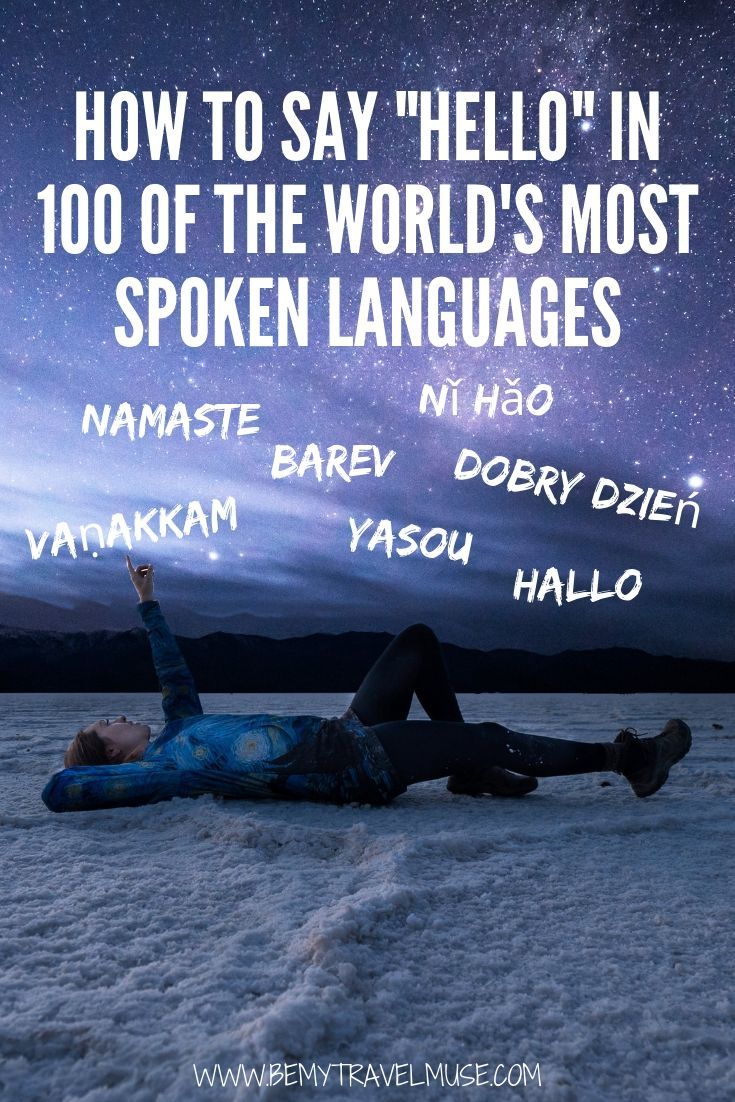
In the famous book, How to Win Friends and Influence People, Dale Carnegie states that “the sweetest and most important sound in any language” is a person’s own name. While that might be true, I’d venture to state that the most important sound is ‘hello’ in the person’s own language.
Without ‘hello’ you don’t have a chance to get to the other words. As anyone who travels and has learned how to say ‘hello’ in different languages knows, nothing can make a person brighten and open up as much as the effort to speak at least ‘hello’ and ‘thank you’ in the local language. It shows that we’re trying, that we care, and that we are conscientious travelers.
That’s why we put together a list to help you learn how to say ‘hello’ in 100 of the world’s most spoken languages:
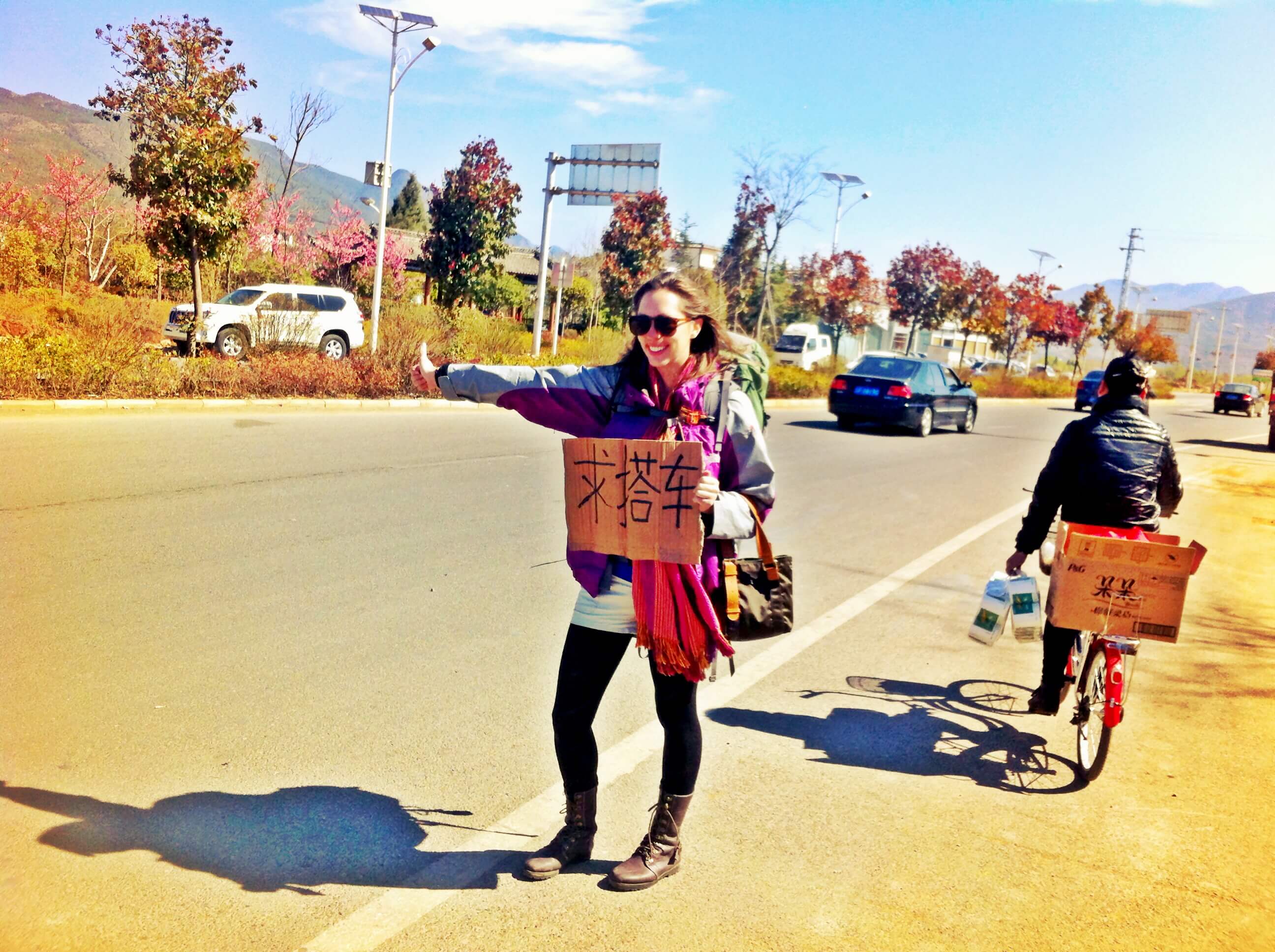
- Mandarin: nǐ hǎo
Where it’s spoken: China, Taiwan, Singapore - Spanish: hola
Where it’s spoken: Hispanic America, Spain, United States, Equatorial Guinea, Western Sahara, Pacific islands
3. English: hello
Where it’s spoken: Australia, Canada, India, Ireland, New Zealand, United Kingdom, United States, South Africa, Singapore, Philippines
4. Hindi: namaste
Where it’s spoken: India, Fiji, Nepal
5. Arabic: márhaban
Where it’s spoken: North Africa, Western Asia (Middle East), East Africa
6. Portuguese: olá, oi, alô
Where it’s spoken: Angola, Brazil, Cape Verde, Mozambique, Portugal, São Tomé and Príncipe, Timor-Leste
7. Bengali: hyālō
Where it’s spoken: Bangladesh, West Bengal (India), Tripura (India), Assam (India)
8. Russian: privet
Where it’s spoken: Russia, former Republics of the Soviet Union, Mongolia
9. Japanese: kon’nichiwa
Where it’s spoken: Japan
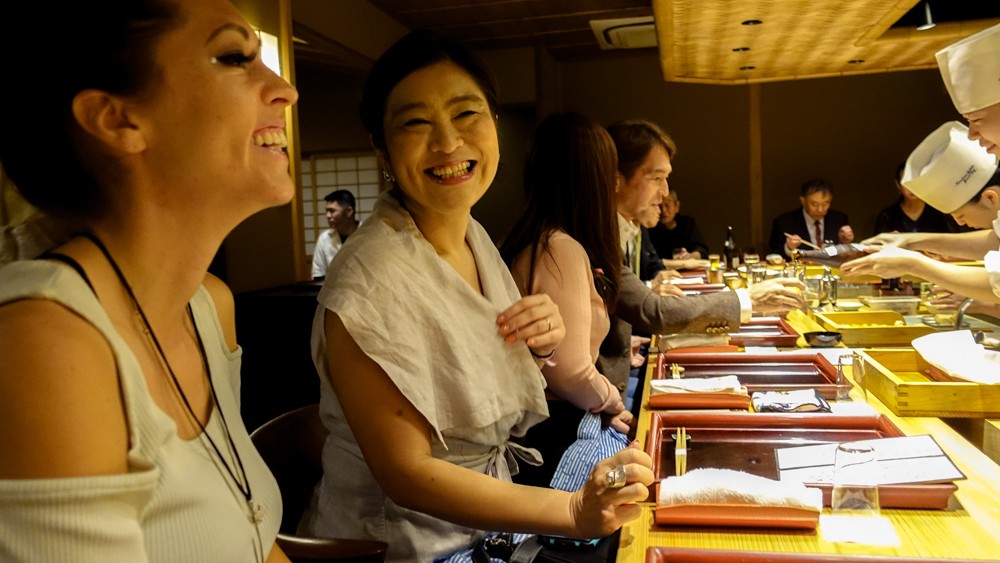
10. Punjabi: sata srī akāla
Where it’s spoken: Punjab region (India, Pakistan)
11. German: hallo, guten tag
Where it’s spoken: Austria, Belgium (Eupen-Malmedy), Germany, Luxembourg, Liechtenstein, Switzerland, South Tirol (in Italy)
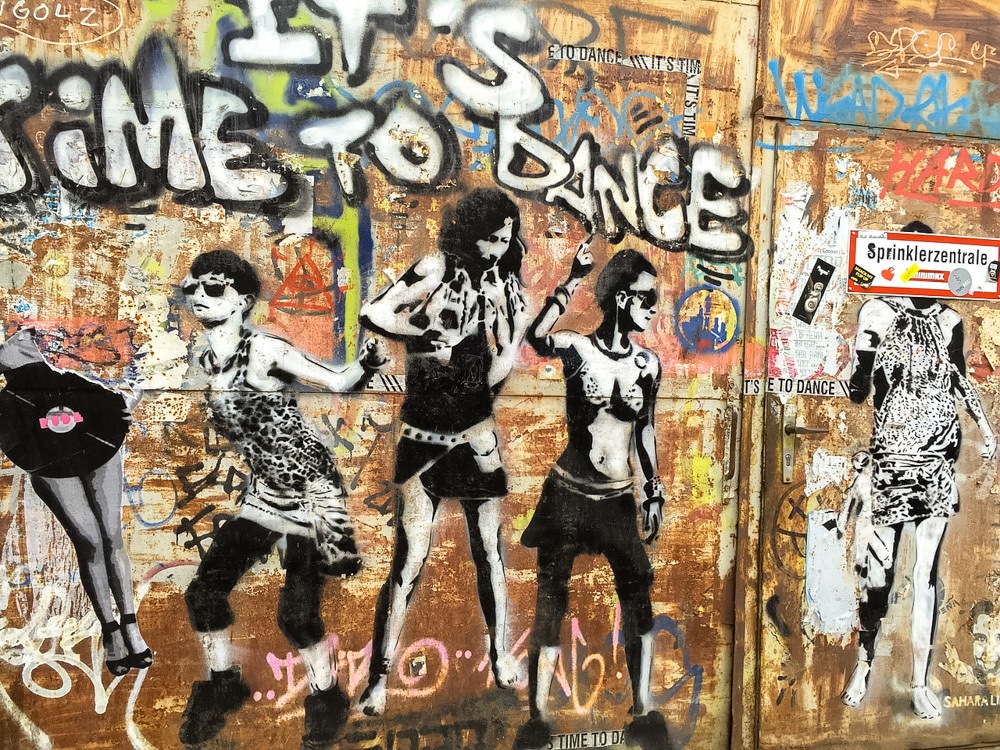
12. Javanese: nggoleki
Where it’s spoken: Java (Indonesia)
13. Wu (Shanghainese): nóng hō
Where it’s spoken: Zhejiang, Shanghai, southern Jiangsu (eastern China)
14. Malay/Indonesian: selamat siang
Where it’s spoken: Indonesia, Malaysia, Brunei, Singapore
15. Korean: annyeong haseyo
Where it’s spoken: North Korea, South Korea
16. Telugu: halō, vandanalu
Where it’s spoken: Andhra Pradesh, Tamil Nadu, Karnataka, Puducherry (India)
17. Vietnamese: xin chào
Where it’s spoken: Vietnam
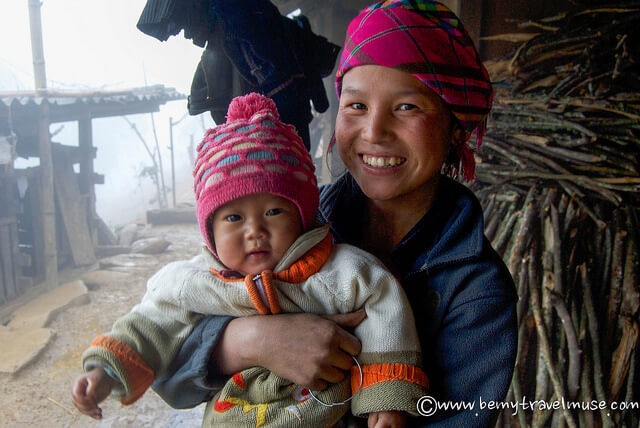
18. French: bonjour
Where it’s spoken: Belgium (Wallonia, Brussels), Canada (particularly Quebec, New Brunswick and Eastern parts of Ontario), France, Switzerland, Francophone Africa, French Caribbean, French Polynesia, various islands in the Indian and Pacific Oceans.
19. Marathi: hĕlō, namaskār
Where it’s spoken: Maharashtra, Goa, Andhra Pradesh, Karnataka, Madhya Pradesh, Gujarat (India)
20. Tamil: vaṇakkam
Tamil Nadu, Karnataka (India), Puducherry (India), Sri Lanka, Singapore, Malaysia, Mauritius
21. Urdu: assalam u alaikum
Where it’s spoken: India, Pakistan
22. Persian/Farsi: salām
Where it’s spoken: Iran, Afghanistan, Tajikistan
23. Turkish: merhaba
Where it’s spoken: Turkey, Cyprus, Bulgaria
24. Cantonese: nǐ hǎo
Where it’s spoken: Guangdong (Canton), southern Guangxi (southern China), Hong Kong, Macau
25. Italian: ciao
Where it’s spoken: Italy, Switzerland, San Marino
26. Thai: sà-wàt-dii
Where it’s spoken: Thailand
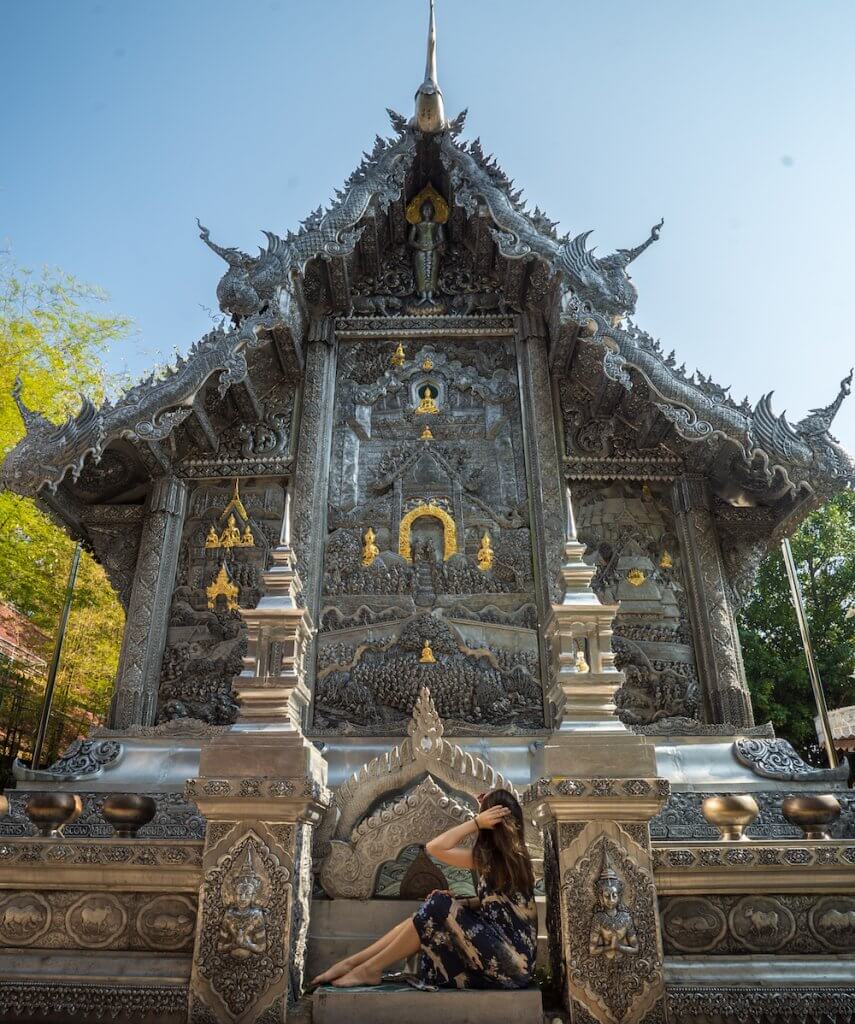
27. Gujarati: namaste
Where it’s spoken: Gujarat (India)
28. Basque: kaixo
Where it’s spoken: Northern Spain
29. Minnan hua: lı́ hó
Where it’s spoken: Fujian, eastern part of Guandong (southeastern China), Hainan (southern China), Taiwan, Malaysia
30. Polish: cześć’
Where it’s spoken: Poland, USA, Germany, United Kingdom, Belarus, western Ukraine, Lithuania
31. Pashto: salam
Where it’s spoken: Afghanistan, Pakistan
32. Kannada: namaskāra
Where it’s spoken: Karnataka, Tamil Nadu, Andhra Pradesh, Maharashtra (India)
33. Malayalam: halēā
Where it’s spoken: Kerala, Lakshadweep, Mahé (India)
34. Sundanese: sampurasun
Where it’s spoken: Java (Indonesia)
35. Chamorro: hafa adai
Where it’s spoken: this is a Austronesian language spoken mainly on the island of Guam, and also in the Marianas Islands.
36. Hausa: sannu
Where it’s spoken: Nigeria
37. Burmese: min-ga-la-ba
Where it’s spoken: Myanmar
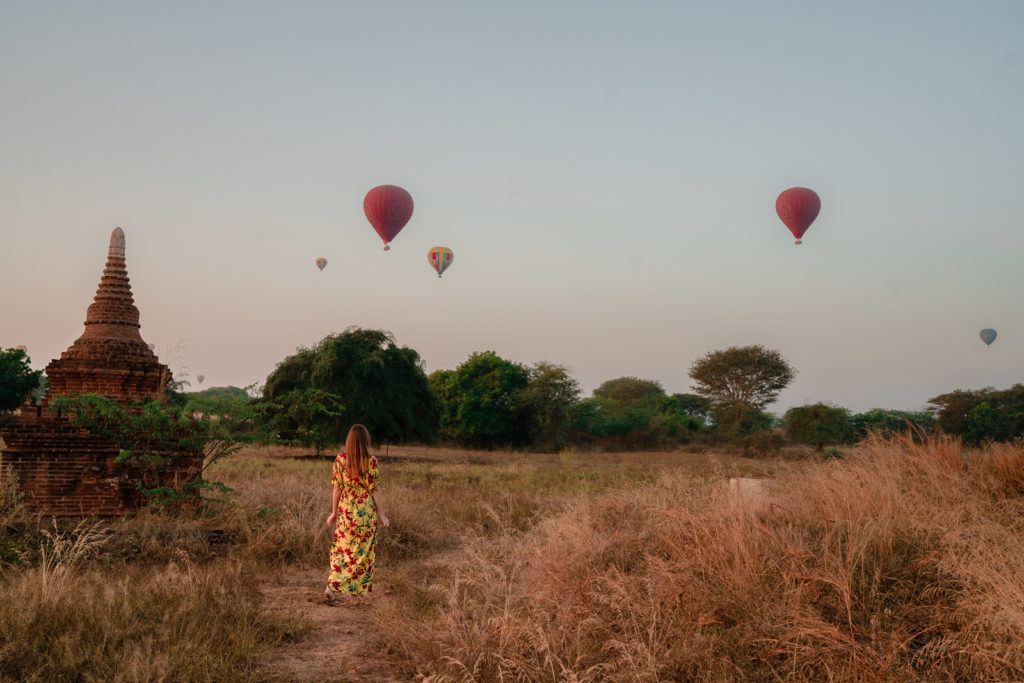
38. Oriya: namaskar
Where it’s spoken: Odisha (India)
39. Armenian: barev
Where it’s spoken: Armenia Georgi and Russia
40. Ukrainian: dobryj den
Where it’s spoken: Ukraine
41. Bhojpuri: prannam
Where it’s spoken: Bihar (India)
42. Tagalog: kamusta
Where it’s spoken: Manila and Northern Philippines
43. Yoruba: e nle o
Where it’s spoken: Nigeria, Benin and Togo
44. Maithili: prannam
Where it’s spoken: Bihar (India)
45. Sindhi: assalam o alaikum
Where it’s spoken: Sindh (Pakistan and neighboring areas in India)
46. Swahili: habari
Where it’s spoken: Kenya, Tanzania, Uganda
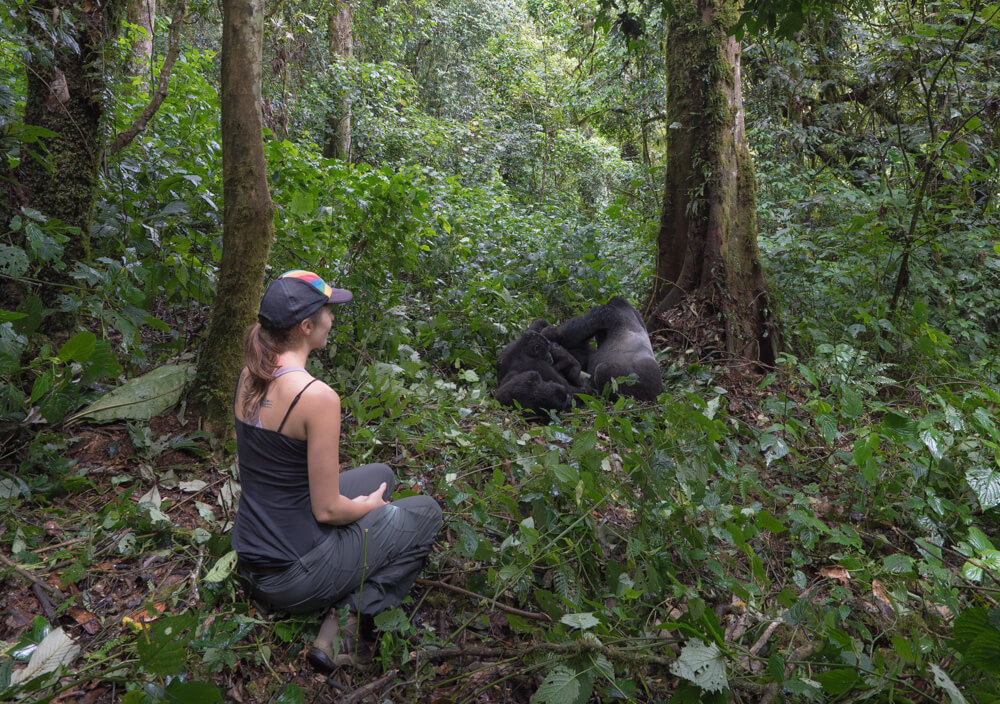
47. Uzbek: salom
Where it’s spoken: Uzbekistan
48. Amharic: selam
Where it’s spoken: Ethiopia
49. Fula: mihofnima
Where it’s spoken: West and Central Africa, from Senegal to Sudan
50. Igbo: kedu
Where it’s spoken: Nigeria
51. Oromo: akkam
Where it’s spoken: Ethiopia and Kenya
52. Romanian: bună
Where it’s spoken: Romania, Moldova
53. Azerbaijani: salam
Where it’s spoken: Azerbaijan and Northern Iran
54. Manipuri/Meitei: khurumjari
Where it’s spoken: North East India, Bangladesh, Burma
55. Chichewa: vanakkam
Where it’s spoken: Chichewa is a Bantu language spoken in parts of Malawi, Zambia, Mozambique
56. Cebuano: kumusta
Where it’s spoken: Central and Southern Philippines
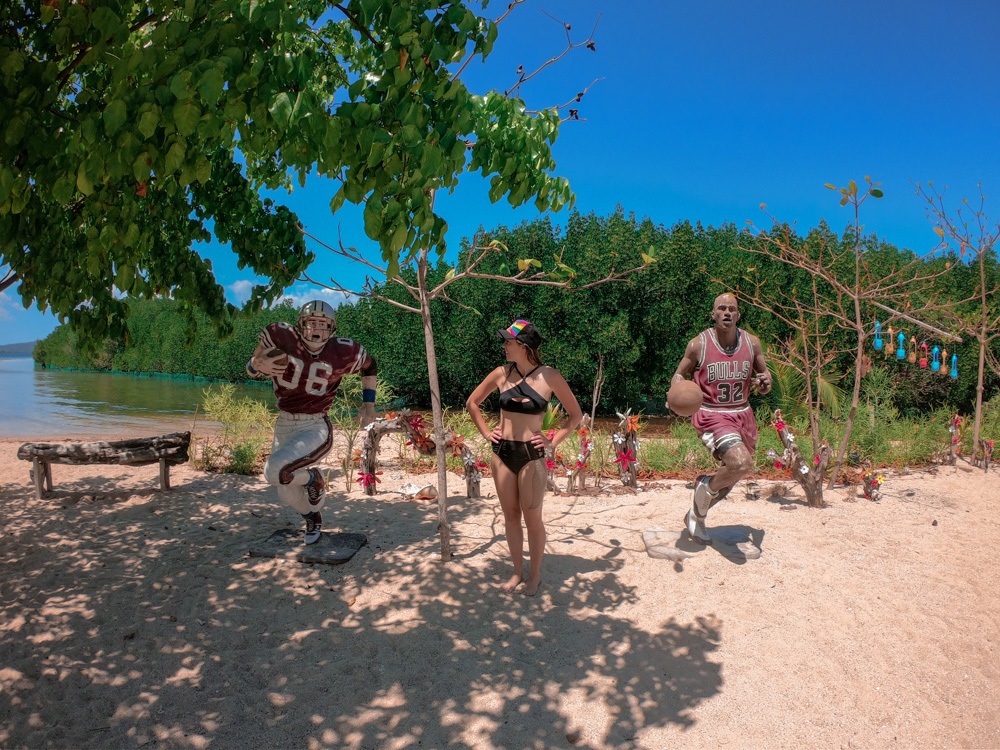
57. Dutch: hallo
Where it’s spoken: Belgium (Flanders, Brussels), Netherlands and Suriname
58. Kurdish: slaw
Where it’s spoken: “Kurdistan”, northern Iraq, Iran, Turkey and Syria
59. Serbo-Croatian: zdravo
Where it’s spoken: Serbia, Croatia, Bosnia and Montenegro
60. Malagasy: salama
Where it’s spoken: Madagascar
61. Nepali: namaste
Where it’s spoken: Nepal and neighbouring areas, Sikkim, (India)
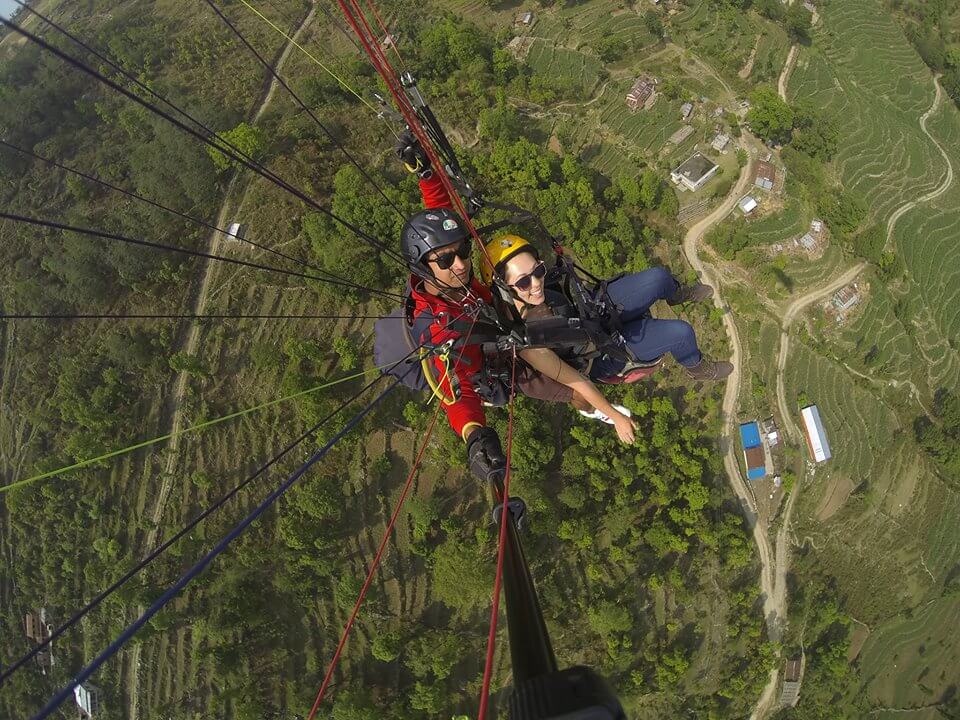
62. Saraiki: tudha kaya haal hai saine? (literally, “How are you?”)
Where it’s spoken: Sindh (Pakistan)
63. Santali: henda ho
Where it’s spoken: India, Bangladesh, Nepal, Bhutan
64. Khmer: choum reap sor
Where it’s spoken: Cambodia
65. Sinhalese: ayubowan
Where it’s spoken: Sri Lanka
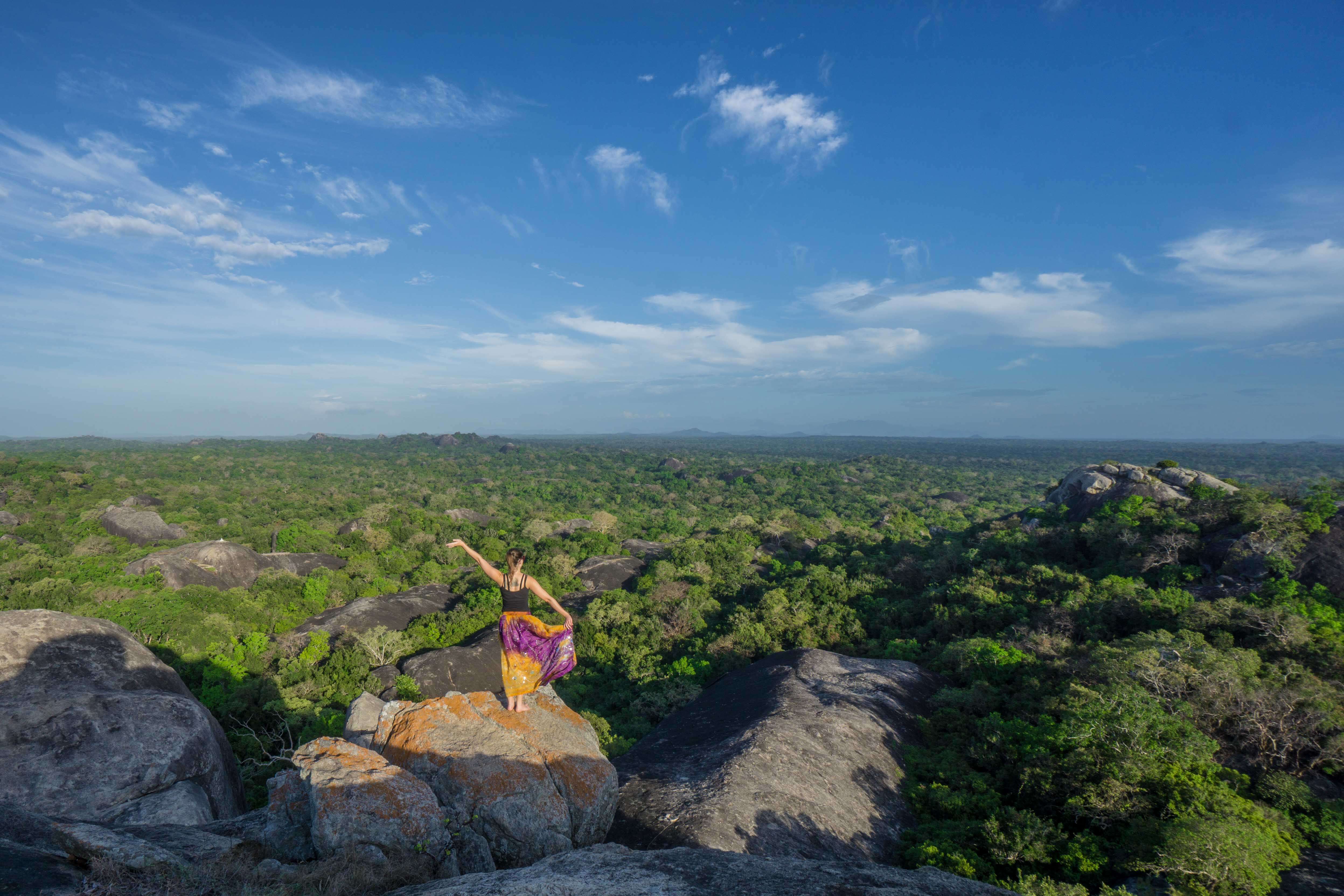
66. Bambara: i ni ce
Where it’s spoken: Bambara is a Mali Mande language with about 3 million speakers in Mali, Burkina Faso and Côte d’Ivoire, Senegal, Gambia, Guinea, Sierra Leone and Ghana
67. Assamese: namaskhar
Assam (India)
68. Madurese: selamat + pagi/siang/sore/malam (for “good morning/day/afternoon/evening”)
Where it’s spoken: Madura, and Java (Indonesia)
69. Somali: salaam alaykum
Where it’s spoken: Somalia, Ethiopia, Kenya, Djibouti, and Yemen
70. Magahi: pernaam (for older person)/subh pyaar (for younger person)
Where it’s spoken: Bihar (India)
71. Dogri: ke aal aee
Where it’s spoken: Kashmir Jamu (india)
72. Marwari: khammaghani
Where it’s spoken: Rajastan (India and Pakistan)
73. Hungarian: szia
Where it’s spoken: Hungary and areas in neighbouring countries
74. Chewa: moni
Where it’s spoken: Malawi, Mozambique, Zambia and Zimbabwe
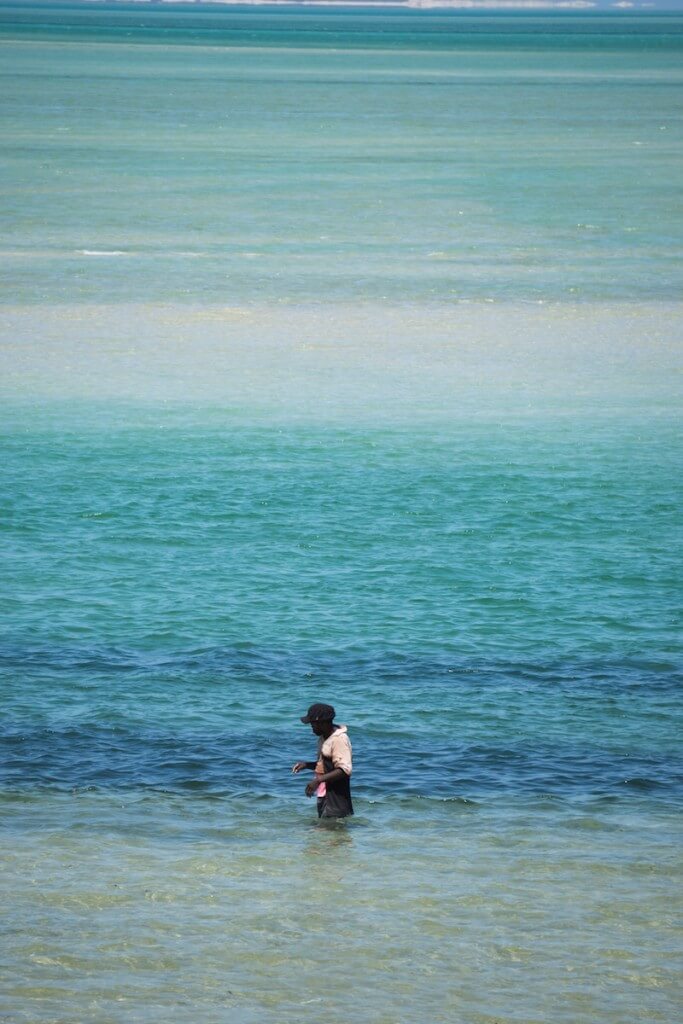
75. Greek: wo ho te sεn? (literally, “How are you?”)
Where it’s spoken: Greece, Cyprus
76. Akan/Twi: kumno
Where it’s spoken: Ghana, Ivory Coast
77. Khasi: Nga ieid ia phi
Where it’s spoken: Meghalaya state in India by the Khasi people.
78. Kazakh: dumela rra (when addressing men)/dumela mama (when addressing women)
Where it’s spoken: Kazakhstan
79. Tswana: dumela rra (when addressing men)/dumela mama (when addressing women)
Where it’s spoken: Botswana and Zimbabwe
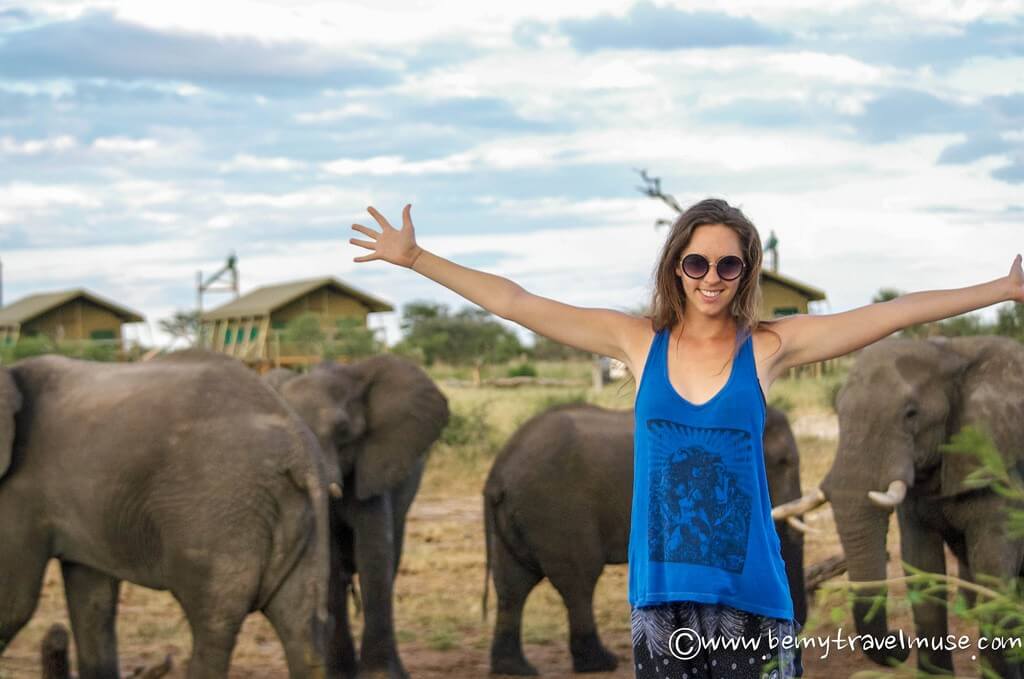
80. Hebrew: Shalom
Where it’s spoken: Israel
81. Zulu: Ngiyakuthanda
Where it’s spoken: South Africa
82. Czech: ahoj
Where it’s spoken: Czech Republic
83. Kinyarwanda: muraho
Where it’s spoken: Rwanda
84. Kokani: deu boro dis dium
Where it’s spoken: Goa (india)
85. Konkani: deu boro dis dium
Goa (India)
86. Haitian Creole: bonjou (before noon)/bonswa (after noon)
Where it’s spoken: Haiti
87. Afrikaans: goeie + dag/môre/middag/naand (means, “good day/morning/afternoon/evening)
Where it’s spoken: South Africa
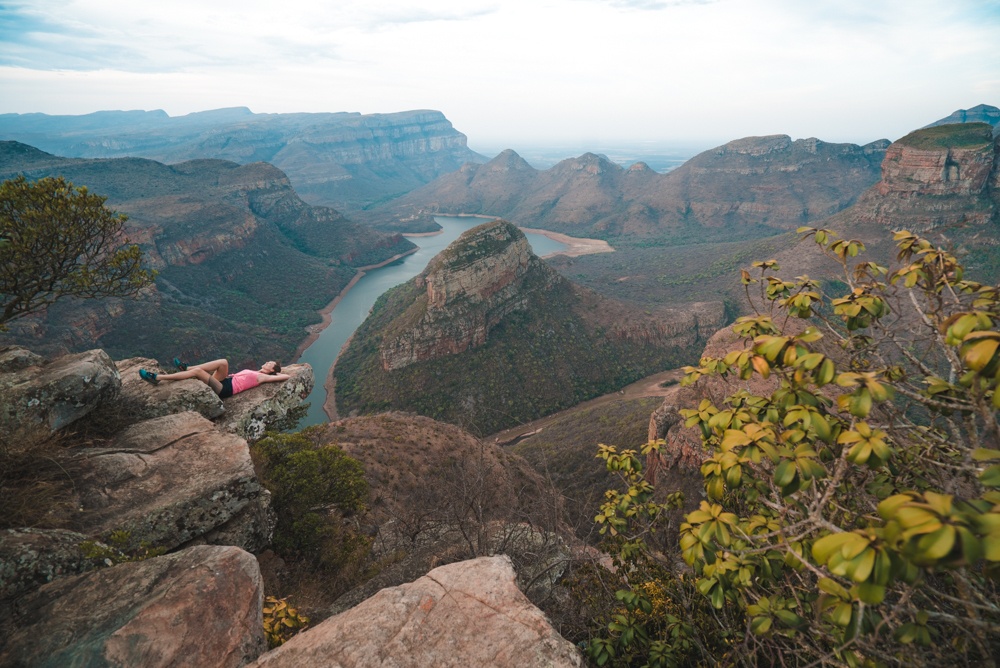
88. Min Dong: nü hou
Where it’s spoken: Fujian (Southeastern China)
89. Ilokano: naimbag nga aldaw (literally, “good day”)
Where it’s spoken: Northern Luzon in the Philippines
90. Quechua: allianchu
Where it’s spoken: Peru and Bolivia, Ecuador, and northern Argentina
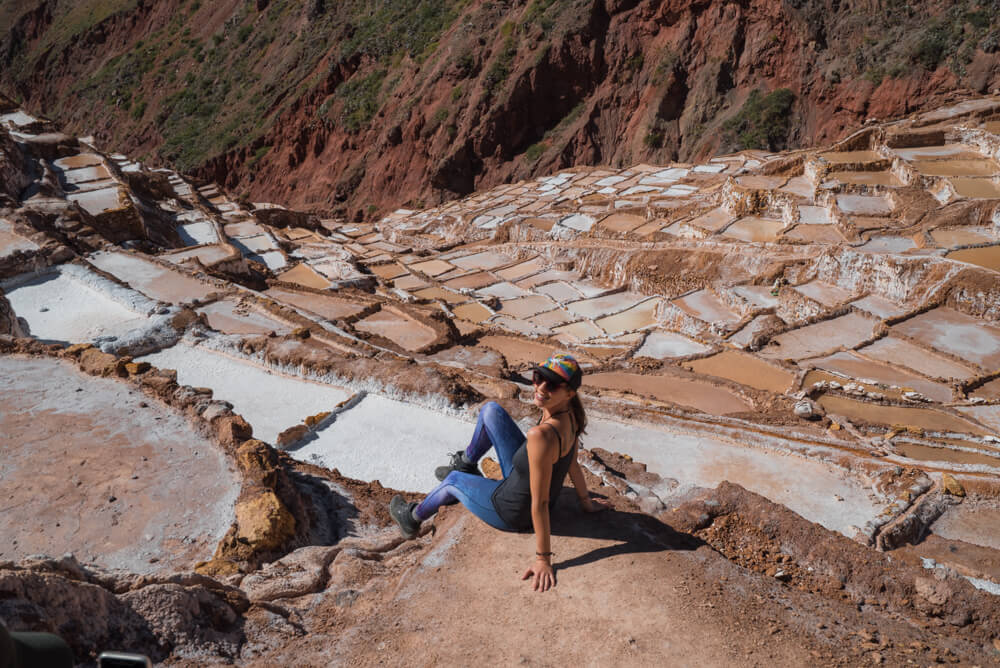
91. Kirundi: bite
Where it’s spoken: Burundi and Uganda
92. Swedish: hej
Where it’s spoken: Sweden and Finland
93. Hmong: Kuv hlub koj
Where it’s spoken: Laos and neighbouring areas
94. Shona: mhoro
Where it’s spoken: Zimbabwe
95. Hiligaynon: hello
Where it’s spoken: Western Visayas in the Philippines
96. Uyghur: yaxshimusiz
Where it’s spoken: Xinjiang (Western China)
97. Balochi: chone tao? (literally, “How are you?”)
Where it’s spoken: Balochistan (province in Pakistan and Iran)
98. Belarusian: dobry dzień
Where it’s spoken: Belarus
99. Mossi: ne y windiga
Where it’s spoken: Burkina Faso
100. Xhosa: mholweni
Where it’s spoken: South Africa, Zimbabwe
Regardless of where you’re traveling to, knowing at least hello can open so many doors. Hopefully this list got you closer to learning some new languages today.
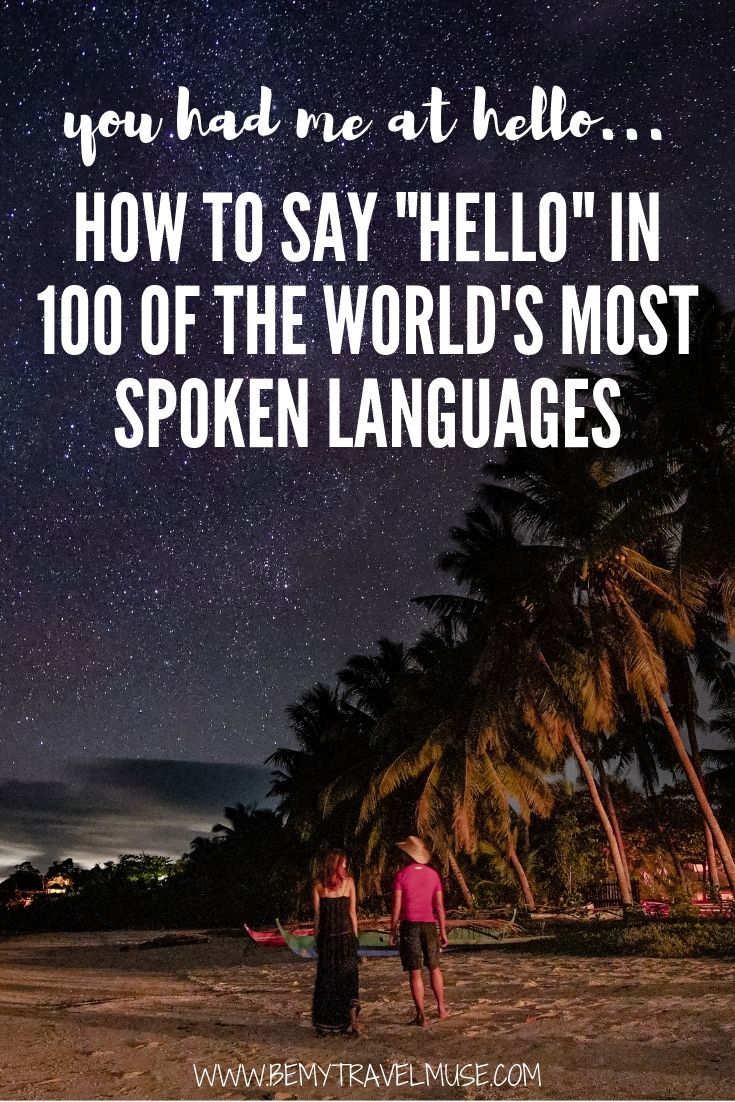
Dayna Brockbank says
This is so important and also really fun to do! My husband and I always try to learn “hello” and “thank you” and it usually gets a smile! I think it shows respect for the country as well as teaching yourself as a traveler that you shouldn’t just expect the locals to speak English! Thank you for putting this together, I have to review some of the ones I’ve forgotten! (:
Rima says
Wow, all this time I thought namaste meant blessings or peace. So this hello is more like an aloha in depth and spirit unlike in English where it is simply a greeting. Do hellos in the other languages also convey a cultural ideal or philosophy?
Kristin says
I tend to laugh in yoga classes when they close with Namaste because I understand it as ‘hello’ like it’s used in Nepal. It’s even the name of a cell service provider there! I believe that words do tie into cultural identity. The word for ‘hello’ in Mandarin is ‘ni hao’, which is a question – how are you? That’s how you greet people. I like that.
Kailey says
The middle eastern greetings tend to mean along the lines of “peace”. assalam u alaikum is peace be upon you and is typically a greeting used by Muslims, including in Arabic.
PRO says
For Cantonese, the pronunciation guide is incorrect.
Nei Ho or Lei Ho is the correct one with the former being more accurate but the latter more prevalent.
Jeevni says
Great Research!!! I enjoyed it lot, it’s actually a fun activity. I would like to have more such blogs from you.
Tridha says
In Bengali that is not how you say “Hello!” You say Namaskar!
Ama says
You could at least appreciate her work and try to be less rude.
Valerie says
Please add this one, Tansi North American Plains Cree language. Pronounced ” tansay”.
Kristin says
Thanks for sharing!
Simi says
I’m Bengali and i Never seen anyone saying hyalo and namaskar is used by Hindus while Muslims use Assalamu walaikum
But The real one is “Ohe”. which is basically forgotten
Kristin says
Thanks for letting me know!
Doc says
Nicely done and very interesting!
I believe Kokani (#84) and Konkani (#85) are the same language, by the way.
Kristin says
thank you!
Αθηνά Γιαννάκου says
Hello,
Please note that the greeting used in Greece and Cyprus has been mixed with the one used in a different country
wo ho te sen is not Greek
In Greece we simply say : Ya soo – pronounced / jΛ so: /
Kind regards
IDK says
I love learning new languages so I loved this
Ebrahim Abdulla says
“33. Malayalam: halēā” sorry this is wrong, in Malayalam it is called “നമസ്കാരം” (namaskaaram).
Kgomotso MASHABA says
Dumelang…
Thank you so much for your page, it helps a lot to learn about different greetings from across the globe. I love it!
I however need to help correct a few things… I am a Motswana from South Africa, and can tell you that Zimbabweans do no speak Setswana. This language is particulrly found in Botswana and South South Africa. Native Zimbabweans speak isiNdebele (Ndebele), which is also one of the languages in South Africa, and isiShona (Shona).
See here – 79. (Se)Tswana: dumela rra (when addressing men)/dumela mama (when addressing women)
Where it’s spoken: Botswana and Zimbabwe (please double check this…).
Also, have a look here – 81. Zulu: Ngiyakuthanda (this means “I love you” in isiZulu (Zulu). When you greet in isiZulu we say Sawubona (singular) / Sanibonani (plural)
Where it’s spoken: South Africa
Thank you for making the relevant corrections. And, keep up the great work educating the world about ways to touch people’s hearts.
Namaste à tous !
Kristin says
Thank you for making this more accurate!
Anson says
Bruh cantonese is nei hou and not ni hao ?
Dee says
apa khabar is hello in Malay spoken in Malaysia, Singapore, Brunei. Selamat siang is used to wish another person good afternoon.
Abdullah says
In Arabic it is alsalam alikum not márhaban as i am a arab